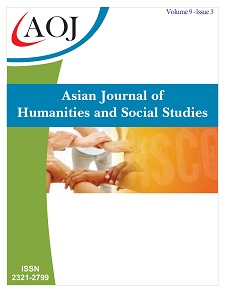Effect of AGIS on Implementation of Electronic Land Administration in FCT, Abuja Nigeria
DOI:
https://doi.org/10.24203/ajhss.v9i3.6649Keywords:
Abuja, AGIS, Electronic, Federal Capital Territory and Land AdministrationAbstract
Land administration in Abuja includes processes of land registration, cadastre, valuation and land inventory. Every country in the world pursues these activities in one form or another irrespective of the stage of development. Developing countries particularly, Nigeria are overwhelmed by challenges of land management and administration. Recent efforts to secure tenure and enhance real property markets are under pressure from increasing demand and competition for land. Effort at implementing land administration reform in the Federal Capital Territory (FCT) have led to inefficiency, incoherent and poor land management. This has undermined the huge potentials and global competitiveness in the sector. This study assesses the effectiveness of Abuja Geographic Information Systems (AGIS) on the implementation of electronic land administration in the FCT. Descriptive survey method was adopted in carrying out this study. Data collection involved sample of 150 applicants/beneficiaries of land, drawn across seven districts to determine how electronic land administration system in the FCT has improved the practice. The findings of the study revealed that electronic land administration in AGIS does not address unequal land distribution. Also, management, acquisition and disposal of public land follow unclear procedures and are not applied equitably and transparently. Formal land delivery takes an inordinate amount of time under the existing frameworks and land fees are unaffordable to many residents in the FCT. Based on the findings, the study recommended the empowerment of the Land Use and Allocation Committee (LUAC) to ensure fairness and equity in land acquisition processes, reorganizing the AGIS workflow, installation of state-of-the art technology for efficiency that will make the processes and procedures for acquisition of land clear to the general public. The study also recommended active participation of key stakeholders through public hearings and citizen’s forums.
References
Antonio, D. (2010). Instituting good governance in the land administration system - the
Philippines’ perspective.
Deininger, Klaus (2014). Land Policies for Growth and Poverty Reduction: Key Issues and
Challenges Ahead. International Federation of Surveyors
Federal Capital Development Authority (FCDA)(2018). Retrieved February 30, 2018 from
http://fcda.gov.ng/index.php/about-fcda/the-geography-of-abuja
Downloads
Published
Issue
Section
License
Copyright (c) 2021 Oruonye E. D., Menwo Ukechi Wilson-Osigwe, Fatima Tukur, Y. M. Ahmed

This work is licensed under a Creative Commons Attribution-NonCommercial 4.0 International License.
- Papers must be submitted on the understanding that they have not been published elsewhere (except in the form of an abstract or as part of a published lecture, review, or thesis) and are not currently under consideration by another journal published by any other publisher.
- It is also the authors responsibility to ensure that the articles emanating from a particular source are submitted with the necessary approval.
- The authors warrant that the paper is original and that he/she is the author of the paper, except for material that is clearly identified as to its original source, with permission notices from the copyright owners where required.
- The authors ensure that all the references carefully and they are accurate in the text as well as in the list of references (and vice versa).
- Authors retain copyright and grant the journal right of first publication with the work simultaneously licensed under a Attribution-NonCommercial 4.0 International that allows others to share the work with an acknowledgement of the work's authorship and initial publication in this journal.
- Authors are able to enter into separate, additional contractual arrangements for the non-exclusive distribution of the journal's published version of the work (e.g., post it to an institutional repository or publish it in a book), with an acknowledgement of its initial publication in this journal.
- Authors are permitted and encouraged to post their work online (e.g., in institutional repositories or on their website) prior to and during the submission process, as it can lead to productive exchanges, as well as earlier and greater citation of published work (See The Effect of Open Access).
- The journal/publisher is not responsible for subsequent uses of the work. It is the author's responsibility to bring an infringement action if so desired by the author.


